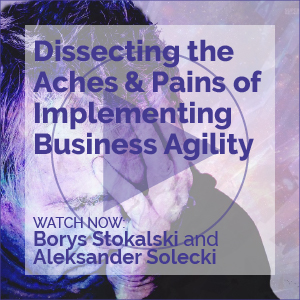How Parler May Have Hedged Its Architectural Bets
Life and Data in a Time of Pandemic, Part IV
2021 Trends — Technology "Underdogs", Culture Change for Successful DevSecOps, more!
2021 Trends — Technology "Underdogs", Culture Change for Successful DevSecOps, more!
Aviation: The Future Is Reinvention
Making the Network Organization Work
Data & Digital Architecture — An Introduction
Focus on Key Uncertainties to Let Good Architecture Emerge
Realizing IoT Potential with 5G
Create Market Insight with Textual Analytics
Top Intriguing Business Agility & Software Engineering Excellence Articles for 2020
As has been our tradition for the last several years, we’ve compiled the five most intriguing articles published by the Business Agility & Software Engineering Excellence practice for today’s Advisor. How did we come up with this list? We chose the articles that garnered the most feedback from Cutter Members. Your questions and comments not only make it possible to create lists like this, they help focus Cutter’s Senior Consultants’ research on the areas that are most important to organizations like yours. So please keep your feedback coming.
Top Intriguing Business Technology & Digital Transformation Strategies Articles for 2020
As has been our tradition for the last several years, we’ve compiled the five most intriguing articles published by Business Technology & Digital Transformation Strategies this year for today’s Advisor. How did we come up with this list? We chose the articles that garnered the most feedback from Cutter Members. Your questions and comments not only make it possible to create lists like this, they help focus Cutter’s Senior Consultants’ research on the areas that are most important to organizations like yours. So please keep your feedback coming.
Top Intriguing Cutter Business Technology Journal Articles for 2020
Top Intriguing Business & Enterprise Architecture Articles for 2020
As has been our tradition for the last several years, we’ve compiled the five most intriguing articles published by the Business & Enterprise Architecture practice for today’s Advisor. How did we come up with this list? We chose the articles that garnered the most feedback from Cutter Members. Your questions and comments not only make it possible to create lists like this, they help focus Cutter’s Senior Consultants’ research on the areas that are most important to organizations like yours. So please keep your feedback coming.
Top Intriguing Data Analytics & Digital Technologies Articles for 2020
As has been our tradition for the last several years, we’ve compiled the five most intriguing articles published by the Data Analytics & Digital Technologies practice this year for today’s Advisor. How did we come up with this list? We chose the articles that garnered the most feedback from Cutter Members and clients and those that created controversy among Cutter Senior Consultants and Fellows.



















